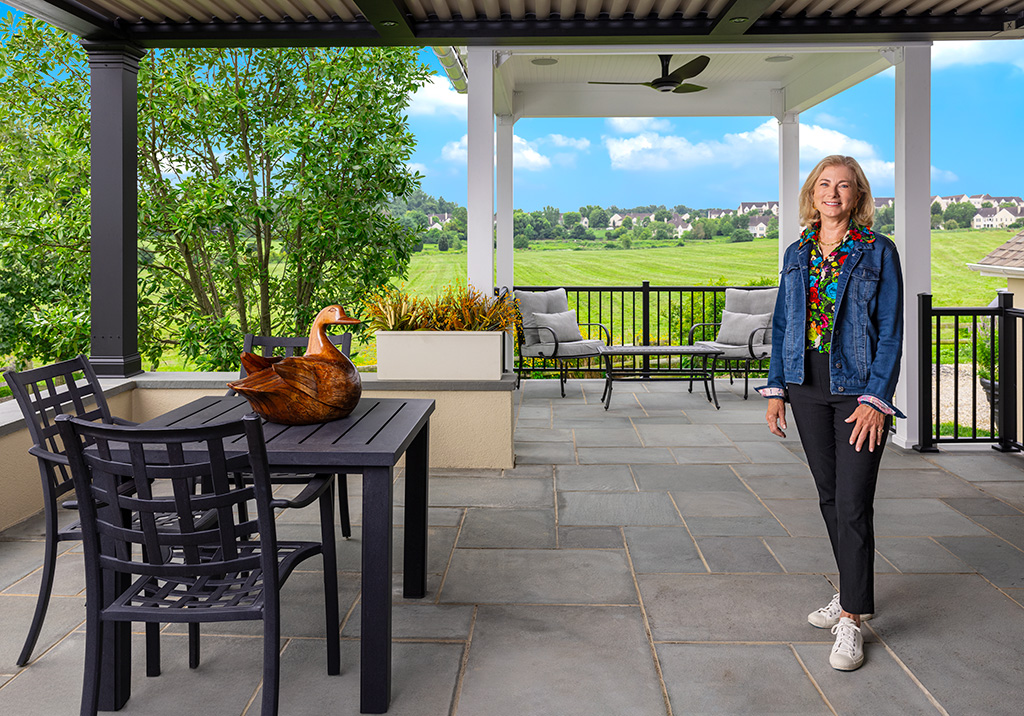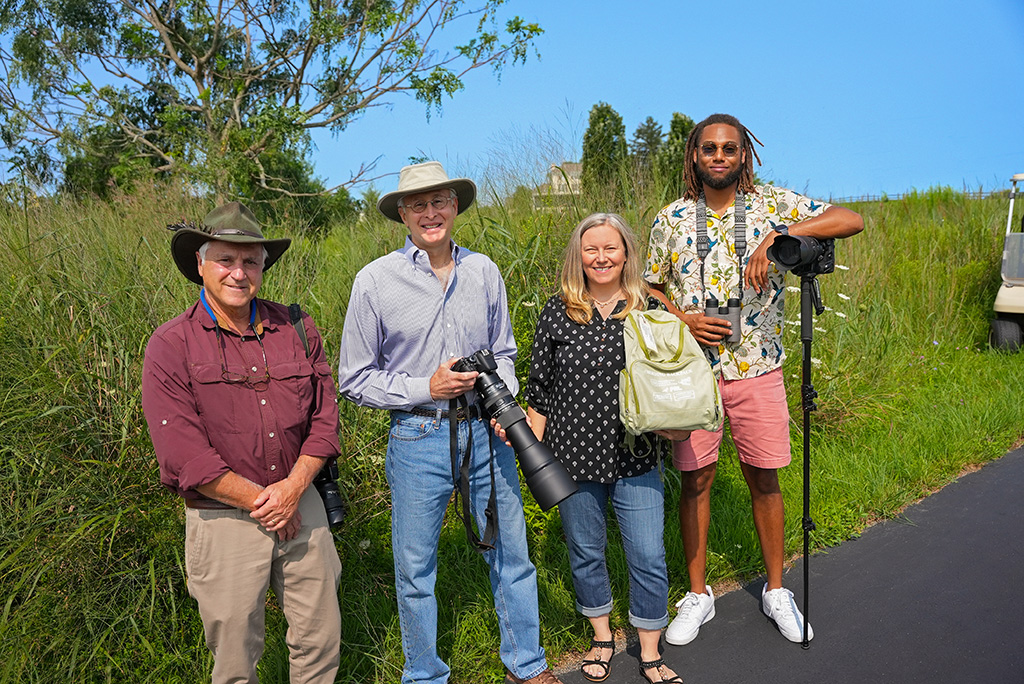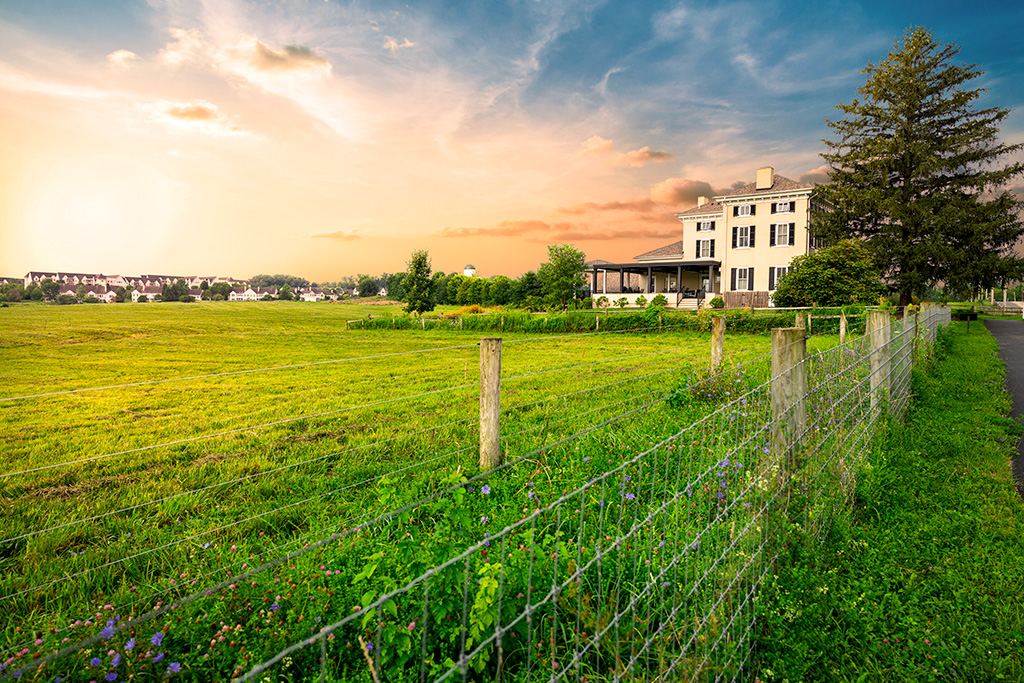An Expansion at Whitemarsh Foundation Brings More People to Nature

Kim Sheppard, President of Whitemarsh Foundation, stands in the new BLBB Education Pavilion.
For residents of The Hill at Whitemarsh, the nearly 450 acres of rolling landscape that are part of the historic Erdenheim Farm add to the bucolic feel of life at The Hill. And for good reason. This historic “gentleman’s farm” in The Hill’s backyard remains one of the last remnants of pastoral life in the Philadelphia area.
Nearly 200 acres of the farm are owned by Whitemarsh Foundation; the remainder is owned by the McCausland family. Almost all of it is protected by conservation easements, which guarantee it remains as open space in perpetuity.
Whitemarsh Foundation was established in 2001 with the singular goal of preserving nearly 200 acres of Erdenheim Farm, preventing it from succumbing to development. In fact, many residents at The Hill played an integral role in the Foundation’s success.
“The Foundation’s land includes the Dixon Meadow Preserve, a 14-acre meadow that includes walking trails, a boardwalk, and wetlands,” said Kim Sheppard, President of Whitemarsh Foundation. “The landscape is open to the public and features native flora and fauna–attracting more than 25% of all bird species in the continental U.S.”
Next to the Preserve sits the Dixon Meadow House, an 1850s farmhouse renovated by the Foundation in 2016. It houses the Foundation’s offices and educational programs, many of which The Hill’s residents regularly attend.
A Hill favorite is “Dixon Meadow Preserve–Four Seasons of Flora and Fauna in the Crown Jewel of the Wissahickon” presented by naturalist Glenn Mason and international conservationist Bill Konstant. The program illustrates the importance of the work the Foundation has done with the creation of the Dixon Meadow Preserve and its relevance in the greater context of worldwide conservation.

Whitemarsh Foundation volunteers Bill Konstant, Glenn Mason, Joanne Woods, and Troy Bynum
“We’ve had such a tremendous response to our programming, and we needed to find a way to expand,” said Kim. “The farmhouse can only accommodate small groups, and inclement weather prevented us from holding programs year-round.”
Their solution? To construct a three-season pavilion on the patio of the farmhouse. With funding from BLBB Charitable, the BLBB Education Pavilion was opened this past summer.
“The roof has movable louvers that automatically open or close depending on the weather conditions,” said Kim. “And the structure is ADA accessible.”
With all this newfound space, the Foundation has also been able to expand its programming to provide underserved and at-risk children more opportunities to experience the wonders of nature.
“Our youth programs allow children with little access to nature to experience it and interact within it in remarkable ways,” Kim said. “We provide transportation and lunches for schools that participate in our programming, which is run by our knowledgeable educators who volunteer their time to help instill an appreciation of nature in the students who visit.”
Joanne Woods, a library supervisor at the Free Library of Philadelphia’s Andorra location, is one such volunteer. Joanne ran an online program for kids during the pandemic called “Nature in Your Neighborhood.” The weekly virtual sessions included lessons on art, nature, and mindfulness and provided students and their families with “homework” to explore a local spot in nature, so Joanne was a perfect volunteer to help launch the Foundation’s new six-week Naturalist Summer Program.
“Kim and I both share the mutual goal of wanting to connect kids to nature who might otherwise not have access to it and to provide positive experiences and opportunities for them in the process,” said Joanne.
Each week, the group was led by a different naturalist, nature artist, or writer for a two-hour session that included nature walks, poetry, illustration workshops, and book discussions. It was such a success that the program has been implemented in various forms year-round.
“For many of the children, this is their first time being out in nature,” Joanne said. “The kids connect to different things–some get so excited to see a chipmunk or a rabbit out in the wild, others love the butterflies or the plants. Sometimes they say the funniest things because they are learning about the world of nature for the first time and don’t have the vocabulary for it yet.”
Troy Bynum, a wildlife photographer and Whitemarsh Foundation’s resident birder, has been working alongside Joanne in creating programs for the children who visit.
“I am surprised at how much the kids are able to retain in such a short period of time,” said Troy. “We may see over 15 bird species during our walk, and some kids are able to remember the names of a lot of them. For me, it reinforces how important our work is for these kids.”
“Providing access to equipment, like binoculars, and the supportive programming that Whitemarsh Foundation provides will spark new interests, launch new hobbies, and maybe even inspire ideas for career paths for some of these children,” said Joanne. “Most importantly, these opportunities foster environmental stewardship. The kids learn about nature, fall in love with the meadow, and then want to protect it.”
Kim echoed that sentiment when she said that their goal with the school programming is to encourage champions of nature.

“There are so many kids without access to these beautiful green spaces,” said Troy. “Without these programs, many of these kids would not be able to have hands-on field experience. It’s so rewarding when kids leave with the ability to identify an Eastern bluebird versus a blue jay.”
“We want to create lifelong learners and open them up to experiential learning,” said Kim. “The BLBB Education Pavilion has transformed what the Foundation can do for a larger community. It allows for more opportunities for learning for both children and adults.”
“The opportunities that Whitemarsh Foundation is providing to kids in Philadelphia and the surrounding areas will ultimately make the world a better place,” added Joanne. “What better reason do you need to fund programs like these?”
If you’re interested in learning more about the educational programs offered by Whitemarsh Foundation or would like to make a donation, visit whitemarshfoundation.org or email Kim Sheppard at kimsheppard@whitemarshfoundation.org